Analysis of Organisational Behaviour at British Airways: Report
VerifiedAdded on 2023/01/06
|12
|4071
|81
Report
AI Summary
This report delves into the organisational behaviour of British Airways, examining how culture, power, and politics influence individual and team performance. It analyzes the company's culture through the Hofstede model, exploring dimensions like power distance, individualism, uncertainty avoidance, masculinity/femininity, and long-term orientation. The report also investigates the different types of power within the organisation, including reward and legitimate power, and how they impact employee behaviour. Furthermore, it evaluates content and process theories of motivation, specifically Maslow's hierarchy of needs and expectancy theory, to assess how motivational techniques can facilitate goal achievement. The report then differentiates between effective and ineffective teams, highlighting the characteristics that contribute to team success. Finally, it applies concepts and philosophies of organisational behaviour to understand how British Airways operates, providing a comprehensive analysis of its internal dynamics and management strategies.
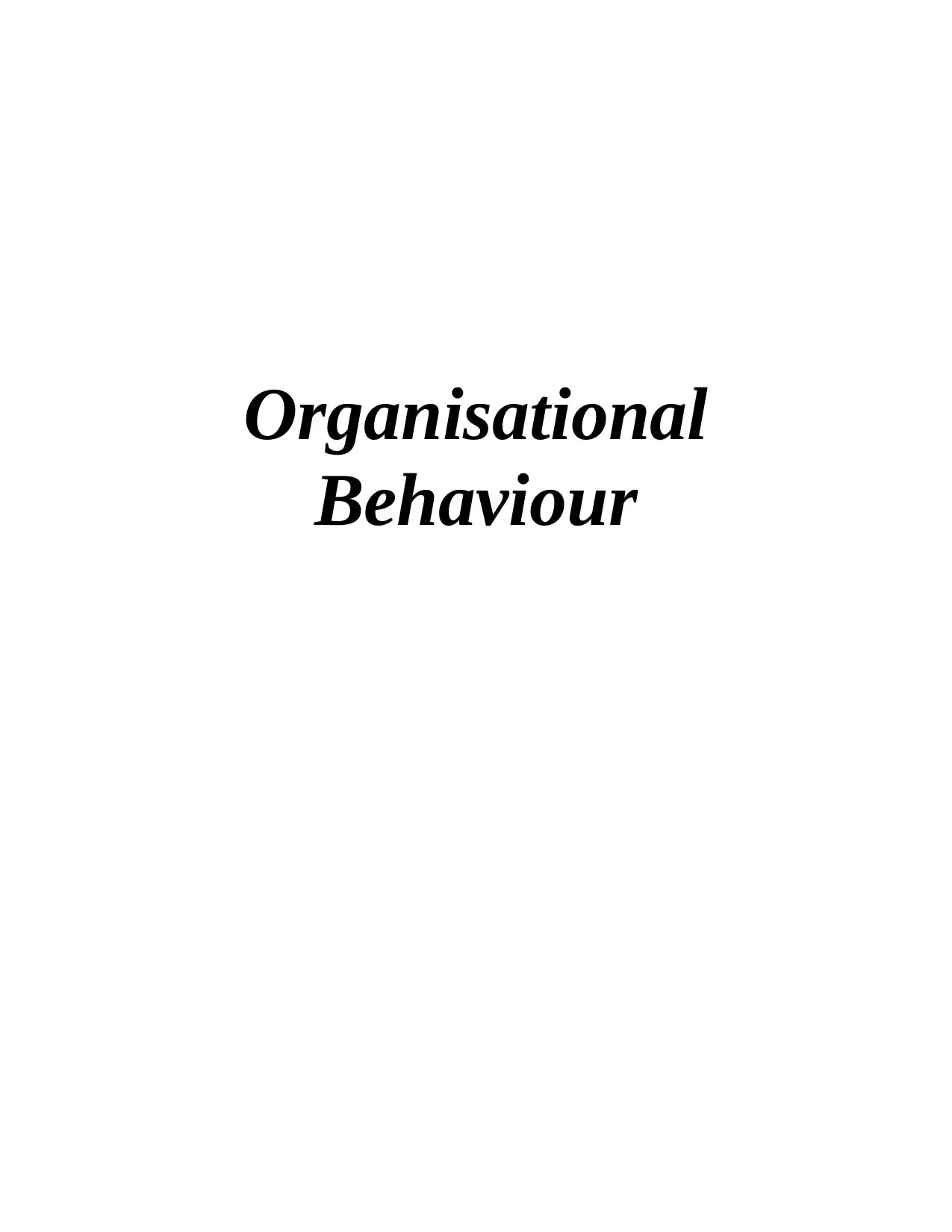
Organisational
Behaviour
Behaviour
Paraphrase This Document
Need a fresh take? Get an instant paraphrase of this document with our AI Paraphraser
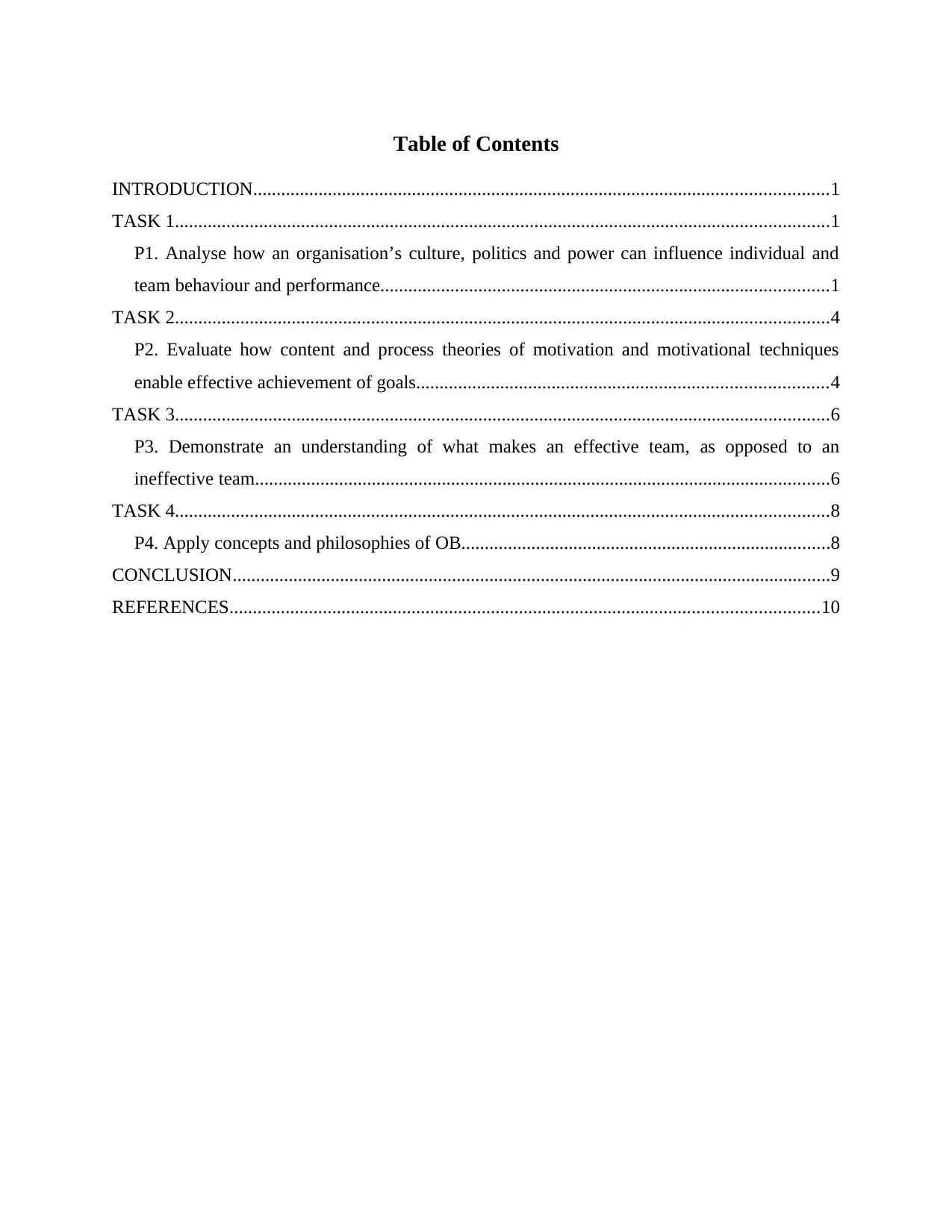
Table of Contents
INTRODUCTION...........................................................................................................................1
TASK 1............................................................................................................................................1
P1. Analyse how an organisation’s culture, politics and power can influence individual and
team behaviour and performance................................................................................................1
TASK 2............................................................................................................................................4
P2. Evaluate how content and process theories of motivation and motivational techniques
enable effective achievement of goals........................................................................................4
TASK 3............................................................................................................................................6
P3. Demonstrate an understanding of what makes an effective team, as opposed to an
ineffective team...........................................................................................................................6
TASK 4............................................................................................................................................8
P4. Apply concepts and philosophies of OB...............................................................................8
CONCLUSION................................................................................................................................9
REFERENCES..............................................................................................................................10
INTRODUCTION...........................................................................................................................1
TASK 1............................................................................................................................................1
P1. Analyse how an organisation’s culture, politics and power can influence individual and
team behaviour and performance................................................................................................1
TASK 2............................................................................................................................................4
P2. Evaluate how content and process theories of motivation and motivational techniques
enable effective achievement of goals........................................................................................4
TASK 3............................................................................................................................................6
P3. Demonstrate an understanding of what makes an effective team, as opposed to an
ineffective team...........................................................................................................................6
TASK 4............................................................................................................................................8
P4. Apply concepts and philosophies of OB...............................................................................8
CONCLUSION................................................................................................................................9
REFERENCES..............................................................................................................................10
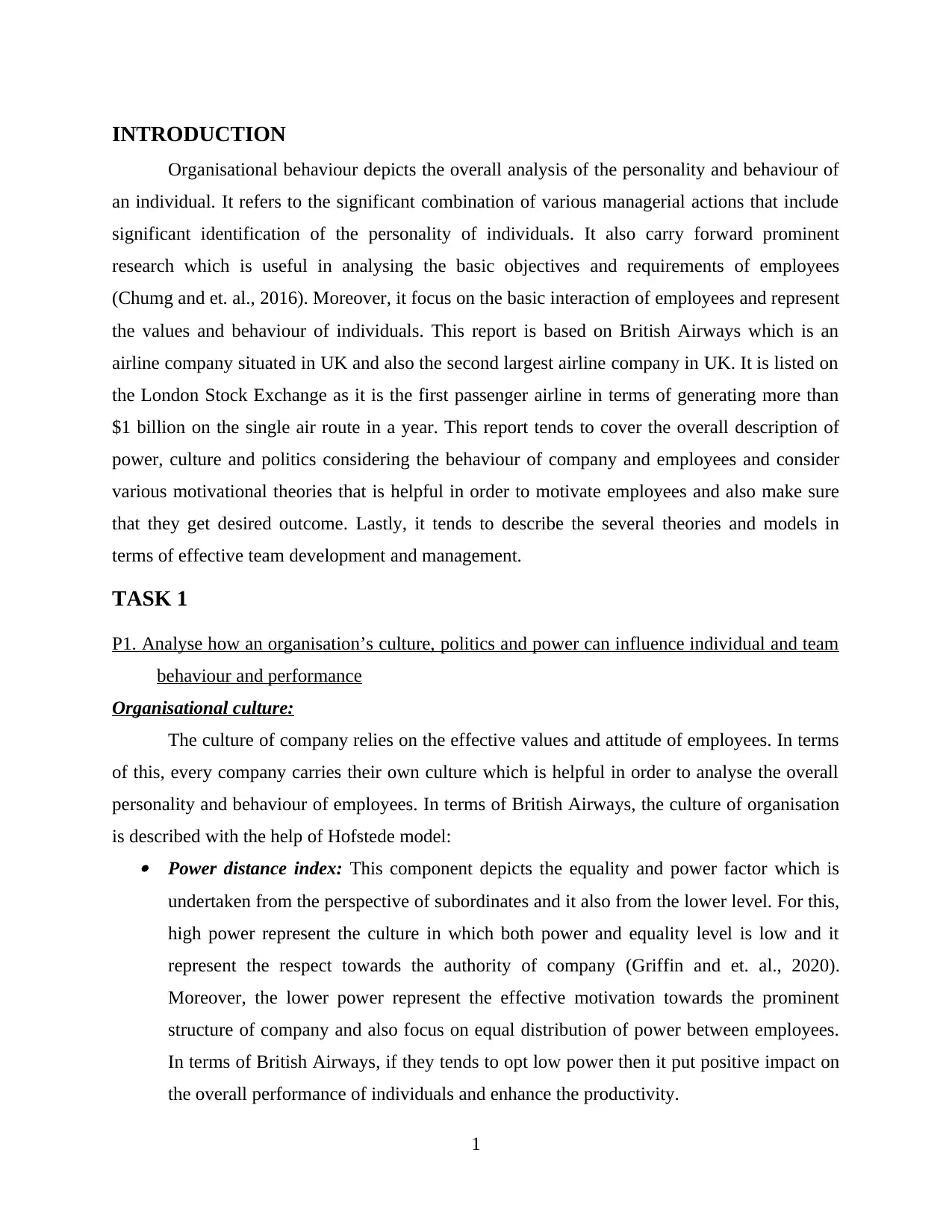
INTRODUCTION
Organisational behaviour depicts the overall analysis of the personality and behaviour of
an individual. It refers to the significant combination of various managerial actions that include
significant identification of the personality of individuals. It also carry forward prominent
research which is useful in analysing the basic objectives and requirements of employees
(Chumg and et. al., 2016). Moreover, it focus on the basic interaction of employees and represent
the values and behaviour of individuals. This report is based on British Airways which is an
airline company situated in UK and also the second largest airline company in UK. It is listed on
the London Stock Exchange as it is the first passenger airline in terms of generating more than
$1 billion on the single air route in a year. This report tends to cover the overall description of
power, culture and politics considering the behaviour of company and employees and consider
various motivational theories that is helpful in order to motivate employees and also make sure
that they get desired outcome. Lastly, it tends to describe the several theories and models in
terms of effective team development and management.
TASK 1
P1. Analyse how an organisation’s culture, politics and power can influence individual and team
behaviour and performance
Organisational culture:
The culture of company relies on the effective values and attitude of employees. In terms
of this, every company carries their own culture which is helpful in order to analyse the overall
personality and behaviour of employees. In terms of British Airways, the culture of organisation
is described with the help of Hofstede model: Power distance index: This component depicts the equality and power factor which is
undertaken from the perspective of subordinates and it also from the lower level. For this,
high power represent the culture in which both power and equality level is low and it
represent the respect towards the authority of company (Griffin and et. al., 2020).
Moreover, the lower power represent the effective motivation towards the prominent
structure of company and also focus on equal distribution of power between employees.
In terms of British Airways, if they tends to opt low power then it put positive impact on
the overall performance of individuals and enhance the productivity.
1
Organisational behaviour depicts the overall analysis of the personality and behaviour of
an individual. It refers to the significant combination of various managerial actions that include
significant identification of the personality of individuals. It also carry forward prominent
research which is useful in analysing the basic objectives and requirements of employees
(Chumg and et. al., 2016). Moreover, it focus on the basic interaction of employees and represent
the values and behaviour of individuals. This report is based on British Airways which is an
airline company situated in UK and also the second largest airline company in UK. It is listed on
the London Stock Exchange as it is the first passenger airline in terms of generating more than
$1 billion on the single air route in a year. This report tends to cover the overall description of
power, culture and politics considering the behaviour of company and employees and consider
various motivational theories that is helpful in order to motivate employees and also make sure
that they get desired outcome. Lastly, it tends to describe the several theories and models in
terms of effective team development and management.
TASK 1
P1. Analyse how an organisation’s culture, politics and power can influence individual and team
behaviour and performance
Organisational culture:
The culture of company relies on the effective values and attitude of employees. In terms
of this, every company carries their own culture which is helpful in order to analyse the overall
personality and behaviour of employees. In terms of British Airways, the culture of organisation
is described with the help of Hofstede model: Power distance index: This component depicts the equality and power factor which is
undertaken from the perspective of subordinates and it also from the lower level. For this,
high power represent the culture in which both power and equality level is low and it
represent the respect towards the authority of company (Griffin and et. al., 2020).
Moreover, the lower power represent the effective motivation towards the prominent
structure of company and also focus on equal distribution of power between employees.
In terms of British Airways, if they tends to opt low power then it put positive impact on
the overall performance of individuals and enhance the productivity.
1
⊘ This is a preview!⊘
Do you want full access?
Subscribe today to unlock all pages.

Trusted by 1+ million students worldwide
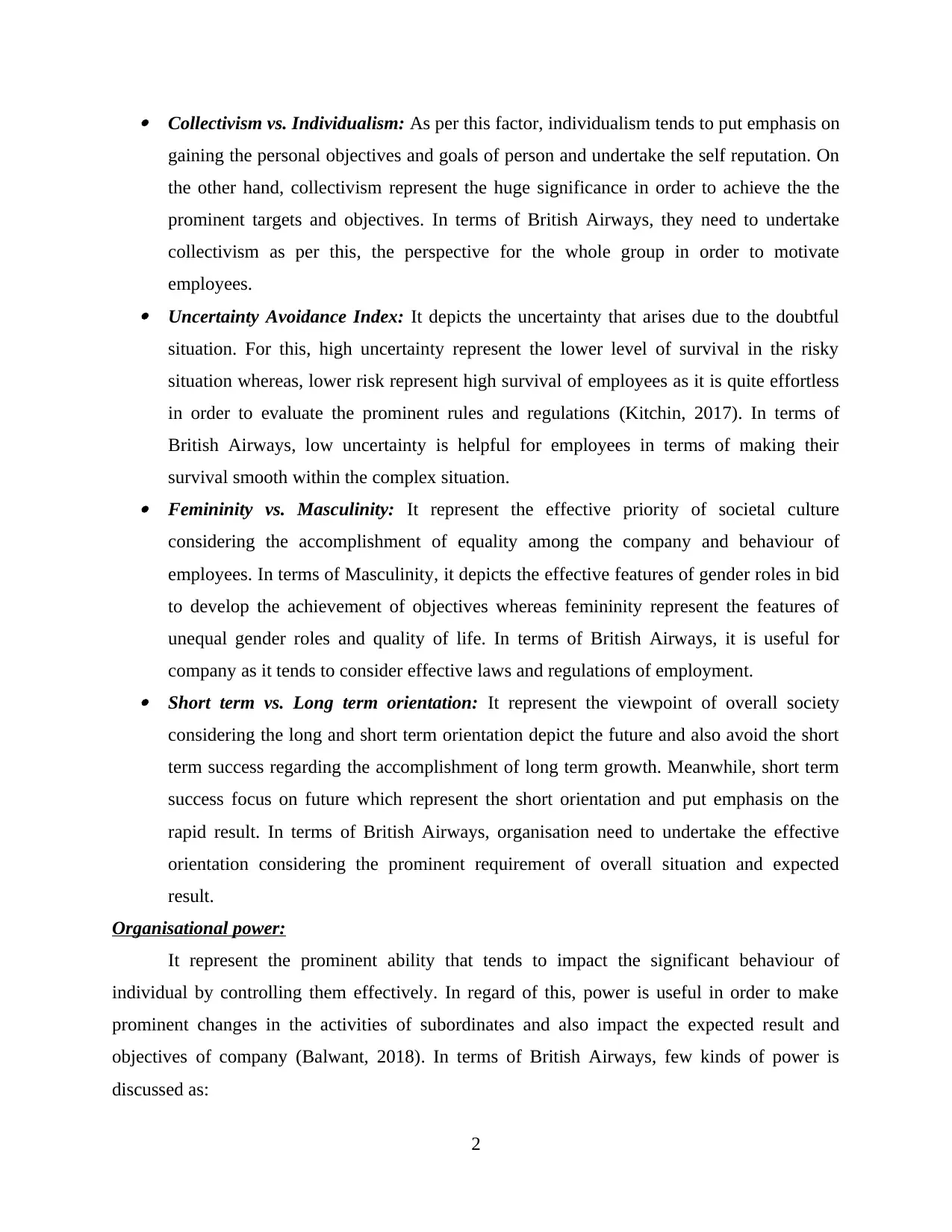
Collectivism vs. Individualism: As per this factor, individualism tends to put emphasis on
gaining the personal objectives and goals of person and undertake the self reputation. On
the other hand, collectivism represent the huge significance in order to achieve the the
prominent targets and objectives. In terms of British Airways, they need to undertake
collectivism as per this, the perspective for the whole group in order to motivate
employees. Uncertainty Avoidance Index: It depicts the uncertainty that arises due to the doubtful
situation. For this, high uncertainty represent the lower level of survival in the risky
situation whereas, lower risk represent high survival of employees as it is quite effortless
in order to evaluate the prominent rules and regulations (Kitchin, 2017). In terms of
British Airways, low uncertainty is helpful for employees in terms of making their
survival smooth within the complex situation. Femininity vs. Masculinity: It represent the effective priority of societal culture
considering the accomplishment of equality among the company and behaviour of
employees. In terms of Masculinity, it depicts the effective features of gender roles in bid
to develop the achievement of objectives whereas femininity represent the features of
unequal gender roles and quality of life. In terms of British Airways, it is useful for
company as it tends to consider effective laws and regulations of employment. Short term vs. Long term orientation: It represent the viewpoint of overall society
considering the long and short term orientation depict the future and also avoid the short
term success regarding the accomplishment of long term growth. Meanwhile, short term
success focus on future which represent the short orientation and put emphasis on the
rapid result. In terms of British Airways, organisation need to undertake the effective
orientation considering the prominent requirement of overall situation and expected
result.
Organisational power:
It represent the prominent ability that tends to impact the significant behaviour of
individual by controlling them effectively. In regard of this, power is useful in order to make
prominent changes in the activities of subordinates and also impact the expected result and
objectives of company (Balwant, 2018). In terms of British Airways, few kinds of power is
discussed as:
2
gaining the personal objectives and goals of person and undertake the self reputation. On
the other hand, collectivism represent the huge significance in order to achieve the the
prominent targets and objectives. In terms of British Airways, they need to undertake
collectivism as per this, the perspective for the whole group in order to motivate
employees. Uncertainty Avoidance Index: It depicts the uncertainty that arises due to the doubtful
situation. For this, high uncertainty represent the lower level of survival in the risky
situation whereas, lower risk represent high survival of employees as it is quite effortless
in order to evaluate the prominent rules and regulations (Kitchin, 2017). In terms of
British Airways, low uncertainty is helpful for employees in terms of making their
survival smooth within the complex situation. Femininity vs. Masculinity: It represent the effective priority of societal culture
considering the accomplishment of equality among the company and behaviour of
employees. In terms of Masculinity, it depicts the effective features of gender roles in bid
to develop the achievement of objectives whereas femininity represent the features of
unequal gender roles and quality of life. In terms of British Airways, it is useful for
company as it tends to consider effective laws and regulations of employment. Short term vs. Long term orientation: It represent the viewpoint of overall society
considering the long and short term orientation depict the future and also avoid the short
term success regarding the accomplishment of long term growth. Meanwhile, short term
success focus on future which represent the short orientation and put emphasis on the
rapid result. In terms of British Airways, organisation need to undertake the effective
orientation considering the prominent requirement of overall situation and expected
result.
Organisational power:
It represent the prominent ability that tends to impact the significant behaviour of
individual by controlling them effectively. In regard of this, power is useful in order to make
prominent changes in the activities of subordinates and also impact the expected result and
objectives of company (Balwant, 2018). In terms of British Airways, few kinds of power is
discussed as:
2
Paraphrase This Document
Need a fresh take? Get an instant paraphrase of this document with our AI Paraphraser
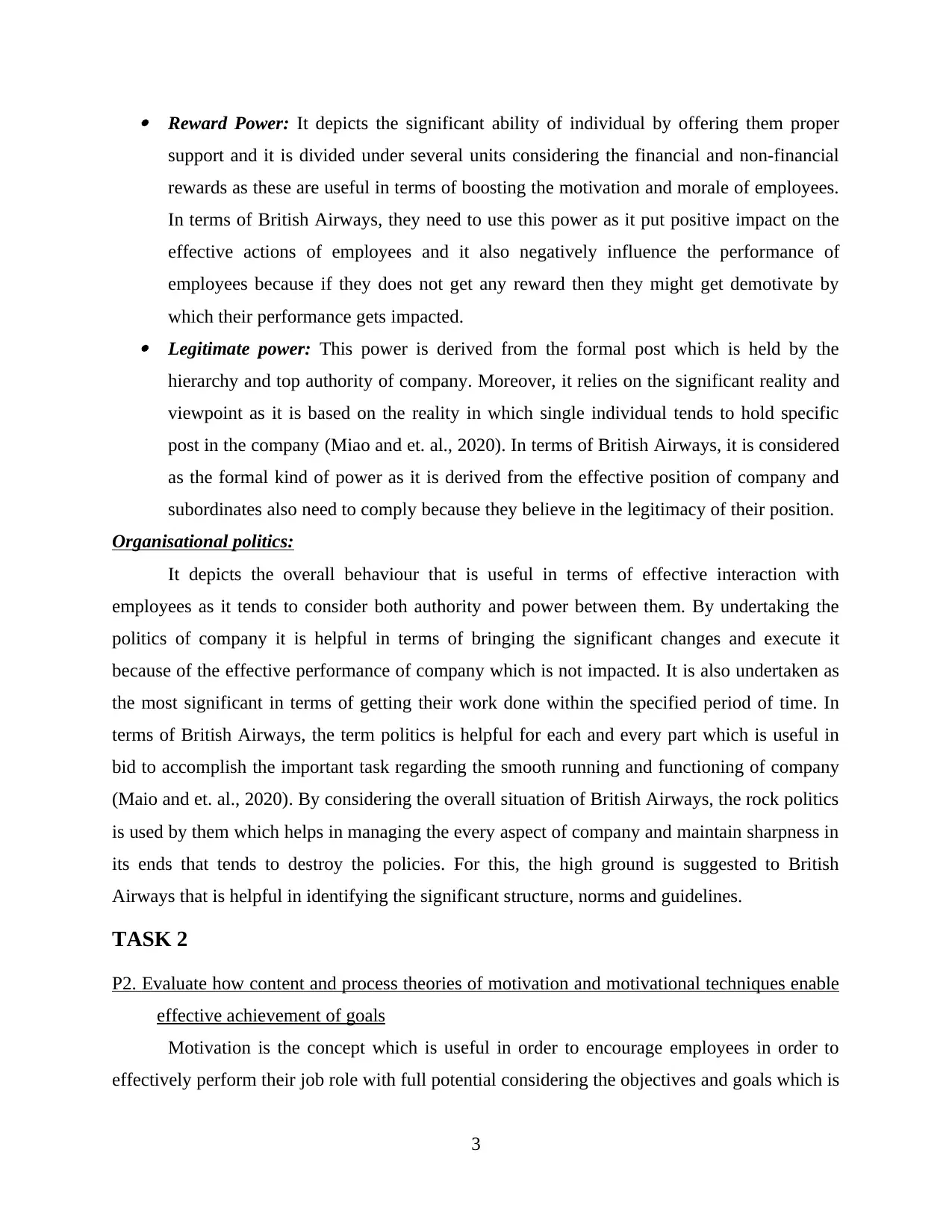
Reward Power: It depicts the significant ability of individual by offering them proper
support and it is divided under several units considering the financial and non-financial
rewards as these are useful in terms of boosting the motivation and morale of employees.
In terms of British Airways, they need to use this power as it put positive impact on the
effective actions of employees and it also negatively influence the performance of
employees because if they does not get any reward then they might get demotivate by
which their performance gets impacted. Legitimate power: This power is derived from the formal post which is held by the
hierarchy and top authority of company. Moreover, it relies on the significant reality and
viewpoint as it is based on the reality in which single individual tends to hold specific
post in the company (Miao and et. al., 2020). In terms of British Airways, it is considered
as the formal kind of power as it is derived from the effective position of company and
subordinates also need to comply because they believe in the legitimacy of their position.
Organisational politics:
It depicts the overall behaviour that is useful in terms of effective interaction with
employees as it tends to consider both authority and power between them. By undertaking the
politics of company it is helpful in terms of bringing the significant changes and execute it
because of the effective performance of company which is not impacted. It is also undertaken as
the most significant in terms of getting their work done within the specified period of time. In
terms of British Airways, the term politics is helpful for each and every part which is useful in
bid to accomplish the important task regarding the smooth running and functioning of company
(Maio and et. al., 2020). By considering the overall situation of British Airways, the rock politics
is used by them which helps in managing the every aspect of company and maintain sharpness in
its ends that tends to destroy the policies. For this, the high ground is suggested to British
Airways that is helpful in identifying the significant structure, norms and guidelines.
TASK 2
P2. Evaluate how content and process theories of motivation and motivational techniques enable
effective achievement of goals
Motivation is the concept which is useful in order to encourage employees in order to
effectively perform their job role with full potential considering the objectives and goals which is
3
support and it is divided under several units considering the financial and non-financial
rewards as these are useful in terms of boosting the motivation and morale of employees.
In terms of British Airways, they need to use this power as it put positive impact on the
effective actions of employees and it also negatively influence the performance of
employees because if they does not get any reward then they might get demotivate by
which their performance gets impacted. Legitimate power: This power is derived from the formal post which is held by the
hierarchy and top authority of company. Moreover, it relies on the significant reality and
viewpoint as it is based on the reality in which single individual tends to hold specific
post in the company (Miao and et. al., 2020). In terms of British Airways, it is considered
as the formal kind of power as it is derived from the effective position of company and
subordinates also need to comply because they believe in the legitimacy of their position.
Organisational politics:
It depicts the overall behaviour that is useful in terms of effective interaction with
employees as it tends to consider both authority and power between them. By undertaking the
politics of company it is helpful in terms of bringing the significant changes and execute it
because of the effective performance of company which is not impacted. It is also undertaken as
the most significant in terms of getting their work done within the specified period of time. In
terms of British Airways, the term politics is helpful for each and every part which is useful in
bid to accomplish the important task regarding the smooth running and functioning of company
(Maio and et. al., 2020). By considering the overall situation of British Airways, the rock politics
is used by them which helps in managing the every aspect of company and maintain sharpness in
its ends that tends to destroy the policies. For this, the high ground is suggested to British
Airways that is helpful in identifying the significant structure, norms and guidelines.
TASK 2
P2. Evaluate how content and process theories of motivation and motivational techniques enable
effective achievement of goals
Motivation is the concept which is useful in order to encourage employees in order to
effectively perform their job role with full potential considering the objectives and goals which is
3
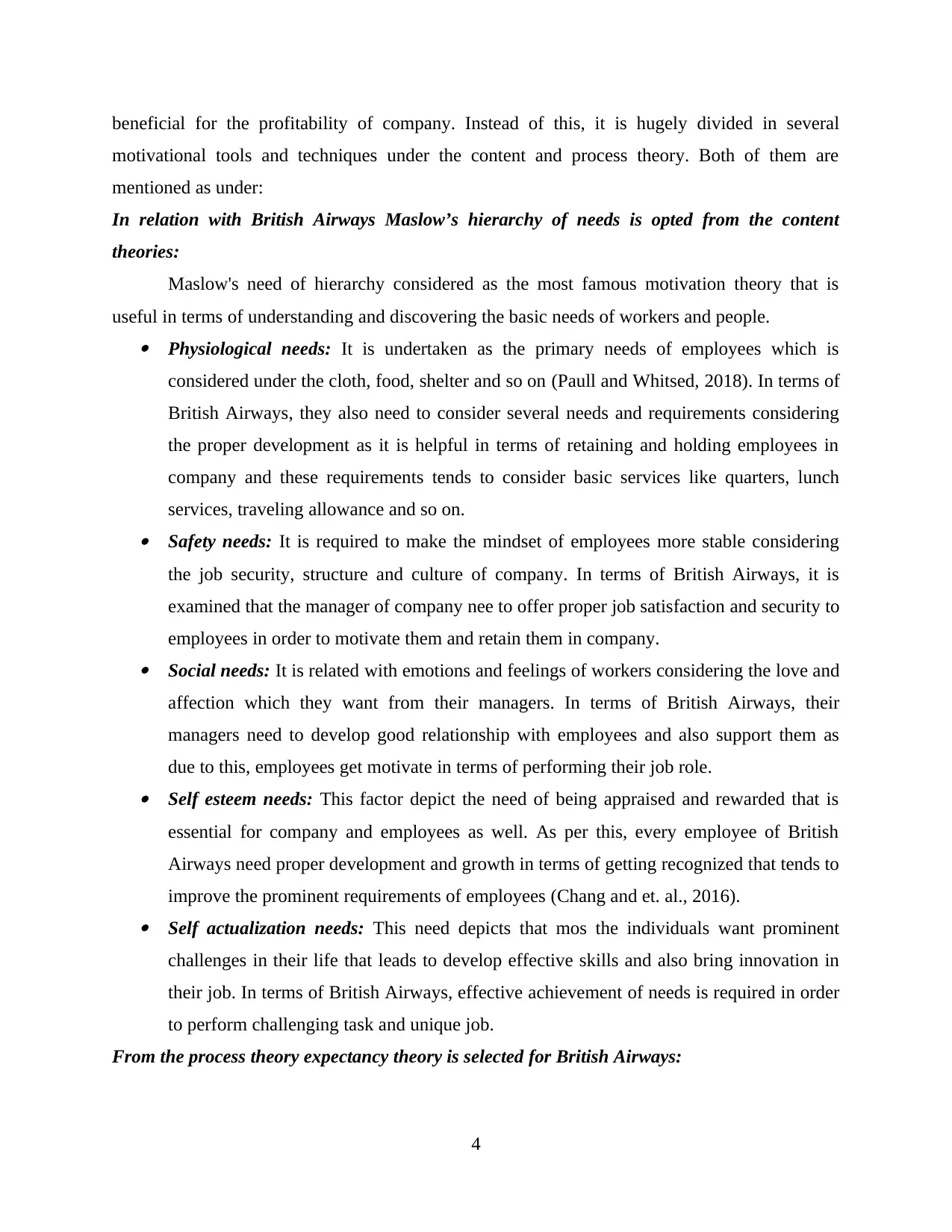
beneficial for the profitability of company. Instead of this, it is hugely divided in several
motivational tools and techniques under the content and process theory. Both of them are
mentioned as under:
In relation with British Airways Maslow’s hierarchy of needs is opted from the content
theories:
Maslow's need of hierarchy considered as the most famous motivation theory that is
useful in terms of understanding and discovering the basic needs of workers and people. Physiological needs: It is undertaken as the primary needs of employees which is
considered under the cloth, food, shelter and so on (Paull and Whitsed, 2018). In terms of
British Airways, they also need to consider several needs and requirements considering
the proper development as it is helpful in terms of retaining and holding employees in
company and these requirements tends to consider basic services like quarters, lunch
services, traveling allowance and so on. Safety needs: It is required to make the mindset of employees more stable considering
the job security, structure and culture of company. In terms of British Airways, it is
examined that the manager of company nee to offer proper job satisfaction and security to
employees in order to motivate them and retain them in company. Social needs: It is related with emotions and feelings of workers considering the love and
affection which they want from their managers. In terms of British Airways, their
managers need to develop good relationship with employees and also support them as
due to this, employees get motivate in terms of performing their job role. Self esteem needs: This factor depict the need of being appraised and rewarded that is
essential for company and employees as well. As per this, every employee of British
Airways need proper development and growth in terms of getting recognized that tends to
improve the prominent requirements of employees (Chang and et. al., 2016). Self actualization needs: This need depicts that mos the individuals want prominent
challenges in their life that leads to develop effective skills and also bring innovation in
their job. In terms of British Airways, effective achievement of needs is required in order
to perform challenging task and unique job.
From the process theory expectancy theory is selected for British Airways:
4
motivational tools and techniques under the content and process theory. Both of them are
mentioned as under:
In relation with British Airways Maslow’s hierarchy of needs is opted from the content
theories:
Maslow's need of hierarchy considered as the most famous motivation theory that is
useful in terms of understanding and discovering the basic needs of workers and people. Physiological needs: It is undertaken as the primary needs of employees which is
considered under the cloth, food, shelter and so on (Paull and Whitsed, 2018). In terms of
British Airways, they also need to consider several needs and requirements considering
the proper development as it is helpful in terms of retaining and holding employees in
company and these requirements tends to consider basic services like quarters, lunch
services, traveling allowance and so on. Safety needs: It is required to make the mindset of employees more stable considering
the job security, structure and culture of company. In terms of British Airways, it is
examined that the manager of company nee to offer proper job satisfaction and security to
employees in order to motivate them and retain them in company. Social needs: It is related with emotions and feelings of workers considering the love and
affection which they want from their managers. In terms of British Airways, their
managers need to develop good relationship with employees and also support them as
due to this, employees get motivate in terms of performing their job role. Self esteem needs: This factor depict the need of being appraised and rewarded that is
essential for company and employees as well. As per this, every employee of British
Airways need proper development and growth in terms of getting recognized that tends to
improve the prominent requirements of employees (Chang and et. al., 2016). Self actualization needs: This need depicts that mos the individuals want prominent
challenges in their life that leads to develop effective skills and also bring innovation in
their job. In terms of British Airways, effective achievement of needs is required in order
to perform challenging task and unique job.
From the process theory expectancy theory is selected for British Airways:
4
⊘ This is a preview!⊘
Do you want full access?
Subscribe today to unlock all pages.

Trusted by 1+ million students worldwide
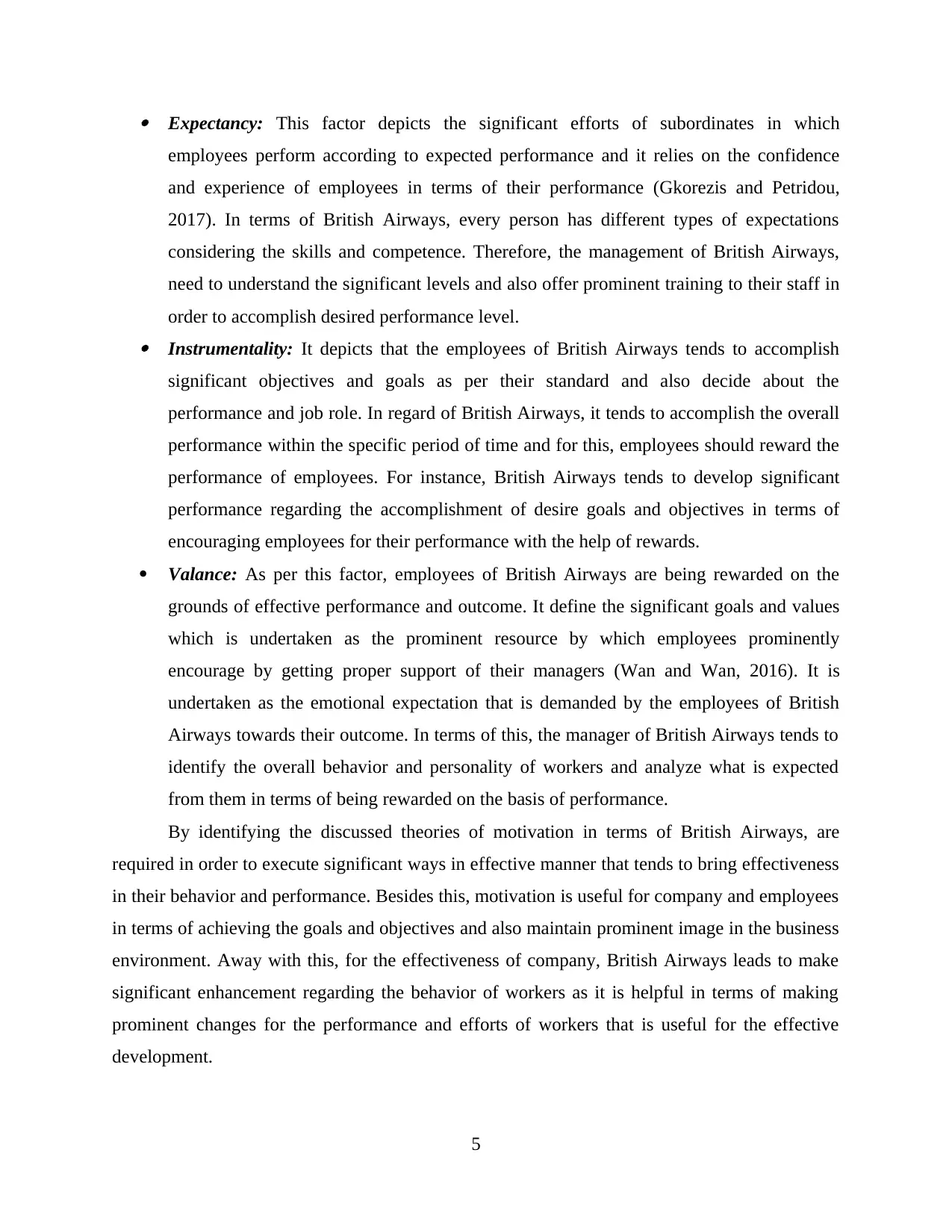
Expectancy: This factor depicts the significant efforts of subordinates in which
employees perform according to expected performance and it relies on the confidence
and experience of employees in terms of their performance (Gkorezis and Petridou,
2017). In terms of British Airways, every person has different types of expectations
considering the skills and competence. Therefore, the management of British Airways,
need to understand the significant levels and also offer prominent training to their staff in
order to accomplish desired performance level. Instrumentality: It depicts that the employees of British Airways tends to accomplish
significant objectives and goals as per their standard and also decide about the
performance and job role. In regard of British Airways, it tends to accomplish the overall
performance within the specific period of time and for this, employees should reward the
performance of employees. For instance, British Airways tends to develop significant
performance regarding the accomplishment of desire goals and objectives in terms of
encouraging employees for their performance with the help of rewards.
Valance: As per this factor, employees of British Airways are being rewarded on the
grounds of effective performance and outcome. It define the significant goals and values
which is undertaken as the prominent resource by which employees prominently
encourage by getting proper support of their managers (Wan and Wan, 2016). It is
undertaken as the emotional expectation that is demanded by the employees of British
Airways towards their outcome. In terms of this, the manager of British Airways tends to
identify the overall behavior and personality of workers and analyze what is expected
from them in terms of being rewarded on the basis of performance.
By identifying the discussed theories of motivation in terms of British Airways, are
required in order to execute significant ways in effective manner that tends to bring effectiveness
in their behavior and performance. Besides this, motivation is useful for company and employees
in terms of achieving the goals and objectives and also maintain prominent image in the business
environment. Away with this, for the effectiveness of company, British Airways leads to make
significant enhancement regarding the behavior of workers as it is helpful in terms of making
prominent changes for the performance and efforts of workers that is useful for the effective
development.
5
employees perform according to expected performance and it relies on the confidence
and experience of employees in terms of their performance (Gkorezis and Petridou,
2017). In terms of British Airways, every person has different types of expectations
considering the skills and competence. Therefore, the management of British Airways,
need to understand the significant levels and also offer prominent training to their staff in
order to accomplish desired performance level. Instrumentality: It depicts that the employees of British Airways tends to accomplish
significant objectives and goals as per their standard and also decide about the
performance and job role. In regard of British Airways, it tends to accomplish the overall
performance within the specific period of time and for this, employees should reward the
performance of employees. For instance, British Airways tends to develop significant
performance regarding the accomplishment of desire goals and objectives in terms of
encouraging employees for their performance with the help of rewards.
Valance: As per this factor, employees of British Airways are being rewarded on the
grounds of effective performance and outcome. It define the significant goals and values
which is undertaken as the prominent resource by which employees prominently
encourage by getting proper support of their managers (Wan and Wan, 2016). It is
undertaken as the emotional expectation that is demanded by the employees of British
Airways towards their outcome. In terms of this, the manager of British Airways tends to
identify the overall behavior and personality of workers and analyze what is expected
from them in terms of being rewarded on the basis of performance.
By identifying the discussed theories of motivation in terms of British Airways, are
required in order to execute significant ways in effective manner that tends to bring effectiveness
in their behavior and performance. Besides this, motivation is useful for company and employees
in terms of achieving the goals and objectives and also maintain prominent image in the business
environment. Away with this, for the effectiveness of company, British Airways leads to make
significant enhancement regarding the behavior of workers as it is helpful in terms of making
prominent changes for the performance and efforts of workers that is useful for the effective
development.
5
Paraphrase This Document
Need a fresh take? Get an instant paraphrase of this document with our AI Paraphraser
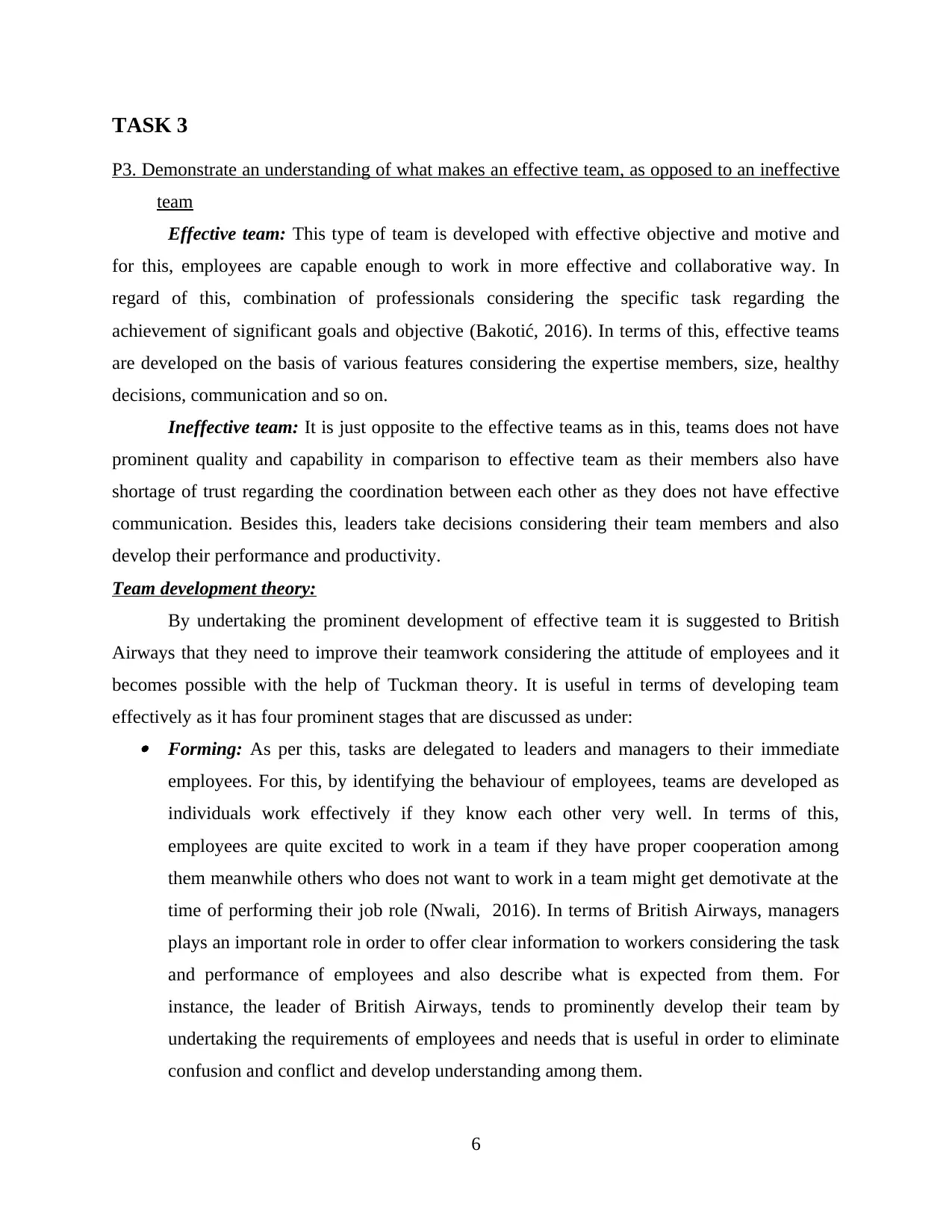
TASK 3
P3. Demonstrate an understanding of what makes an effective team, as opposed to an ineffective
team
Effective team: This type of team is developed with effective objective and motive and
for this, employees are capable enough to work in more effective and collaborative way. In
regard of this, combination of professionals considering the specific task regarding the
achievement of significant goals and objective (Bakotić, 2016). In terms of this, effective teams
are developed on the basis of various features considering the expertise members, size, healthy
decisions, communication and so on.
Ineffective team: It is just opposite to the effective teams as in this, teams does not have
prominent quality and capability in comparison to effective team as their members also have
shortage of trust regarding the coordination between each other as they does not have effective
communication. Besides this, leaders take decisions considering their team members and also
develop their performance and productivity.
Team development theory:
By undertaking the prominent development of effective team it is suggested to British
Airways that they need to improve their teamwork considering the attitude of employees and it
becomes possible with the help of Tuckman theory. It is useful in terms of developing team
effectively as it has four prominent stages that are discussed as under: Forming: As per this, tasks are delegated to leaders and managers to their immediate
employees. For this, by identifying the behaviour of employees, teams are developed as
individuals work effectively if they know each other very well. In terms of this,
employees are quite excited to work in a team if they have proper cooperation among
them meanwhile others who does not want to work in a team might get demotivate at the
time of performing their job role (Nwali, 2016). In terms of British Airways, managers
plays an important role in order to offer clear information to workers considering the task
and performance of employees and also describe what is expected from them. For
instance, the leader of British Airways, tends to prominently develop their team by
undertaking the requirements of employees and needs that is useful in order to eliminate
confusion and conflict and develop understanding among them.
6
P3. Demonstrate an understanding of what makes an effective team, as opposed to an ineffective
team
Effective team: This type of team is developed with effective objective and motive and
for this, employees are capable enough to work in more effective and collaborative way. In
regard of this, combination of professionals considering the specific task regarding the
achievement of significant goals and objective (Bakotić, 2016). In terms of this, effective teams
are developed on the basis of various features considering the expertise members, size, healthy
decisions, communication and so on.
Ineffective team: It is just opposite to the effective teams as in this, teams does not have
prominent quality and capability in comparison to effective team as their members also have
shortage of trust regarding the coordination between each other as they does not have effective
communication. Besides this, leaders take decisions considering their team members and also
develop their performance and productivity.
Team development theory:
By undertaking the prominent development of effective team it is suggested to British
Airways that they need to improve their teamwork considering the attitude of employees and it
becomes possible with the help of Tuckman theory. It is useful in terms of developing team
effectively as it has four prominent stages that are discussed as under: Forming: As per this, tasks are delegated to leaders and managers to their immediate
employees. For this, by identifying the behaviour of employees, teams are developed as
individuals work effectively if they know each other very well. In terms of this,
employees are quite excited to work in a team if they have proper cooperation among
them meanwhile others who does not want to work in a team might get demotivate at the
time of performing their job role (Nwali, 2016). In terms of British Airways, managers
plays an important role in order to offer clear information to workers considering the task
and performance of employees and also describe what is expected from them. For
instance, the leader of British Airways, tends to prominently develop their team by
undertaking the requirements of employees and needs that is useful in order to eliminate
confusion and conflict and develop understanding among them.
6
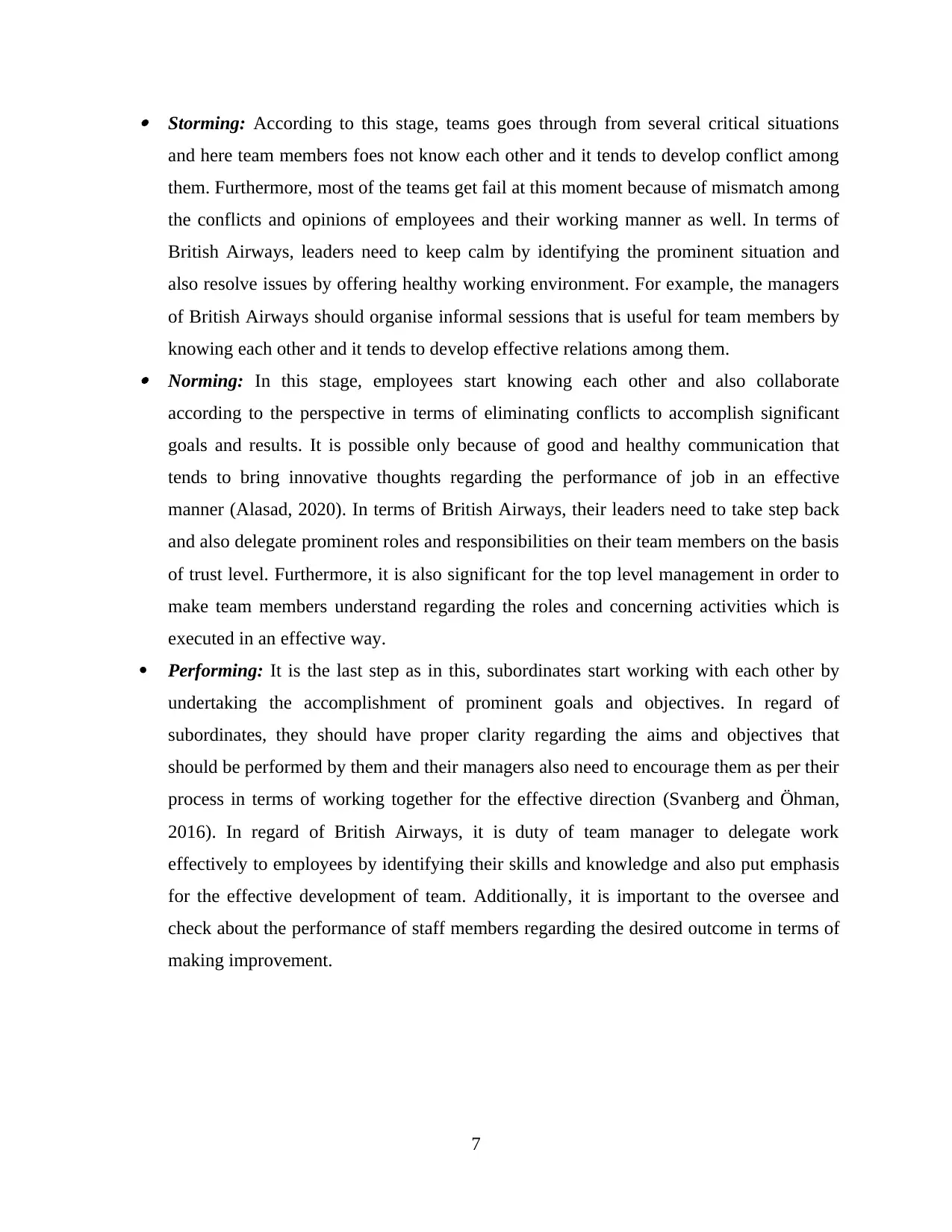
Storming: According to this stage, teams goes through from several critical situations
and here team members foes not know each other and it tends to develop conflict among
them. Furthermore, most of the teams get fail at this moment because of mismatch among
the conflicts and opinions of employees and their working manner as well. In terms of
British Airways, leaders need to keep calm by identifying the prominent situation and
also resolve issues by offering healthy working environment. For example, the managers
of British Airways should organise informal sessions that is useful for team members by
knowing each other and it tends to develop effective relations among them. Norming: In this stage, employees start knowing each other and also collaborate
according to the perspective in terms of eliminating conflicts to accomplish significant
goals and results. It is possible only because of good and healthy communication that
tends to bring innovative thoughts regarding the performance of job in an effective
manner (Alasad, 2020). In terms of British Airways, their leaders need to take step back
and also delegate prominent roles and responsibilities on their team members on the basis
of trust level. Furthermore, it is also significant for the top level management in order to
make team members understand regarding the roles and concerning activities which is
executed in an effective way.
Performing: It is the last step as in this, subordinates start working with each other by
undertaking the accomplishment of prominent goals and objectives. In regard of
subordinates, they should have proper clarity regarding the aims and objectives that
should be performed by them and their managers also need to encourage them as per their
process in terms of working together for the effective direction (Svanberg and Öhman,
2016). In regard of British Airways, it is duty of team manager to delegate work
effectively to employees by identifying their skills and knowledge and also put emphasis
for the effective development of team. Additionally, it is important to the oversee and
check about the performance of staff members regarding the desired outcome in terms of
making improvement.
7
and here team members foes not know each other and it tends to develop conflict among
them. Furthermore, most of the teams get fail at this moment because of mismatch among
the conflicts and opinions of employees and their working manner as well. In terms of
British Airways, leaders need to keep calm by identifying the prominent situation and
also resolve issues by offering healthy working environment. For example, the managers
of British Airways should organise informal sessions that is useful for team members by
knowing each other and it tends to develop effective relations among them. Norming: In this stage, employees start knowing each other and also collaborate
according to the perspective in terms of eliminating conflicts to accomplish significant
goals and results. It is possible only because of good and healthy communication that
tends to bring innovative thoughts regarding the performance of job in an effective
manner (Alasad, 2020). In terms of British Airways, their leaders need to take step back
and also delegate prominent roles and responsibilities on their team members on the basis
of trust level. Furthermore, it is also significant for the top level management in order to
make team members understand regarding the roles and concerning activities which is
executed in an effective way.
Performing: It is the last step as in this, subordinates start working with each other by
undertaking the accomplishment of prominent goals and objectives. In regard of
subordinates, they should have proper clarity regarding the aims and objectives that
should be performed by them and their managers also need to encourage them as per their
process in terms of working together for the effective direction (Svanberg and Öhman,
2016). In regard of British Airways, it is duty of team manager to delegate work
effectively to employees by identifying their skills and knowledge and also put emphasis
for the effective development of team. Additionally, it is important to the oversee and
check about the performance of staff members regarding the desired outcome in terms of
making improvement.
7
⊘ This is a preview!⊘
Do you want full access?
Subscribe today to unlock all pages.

Trusted by 1+ million students worldwide
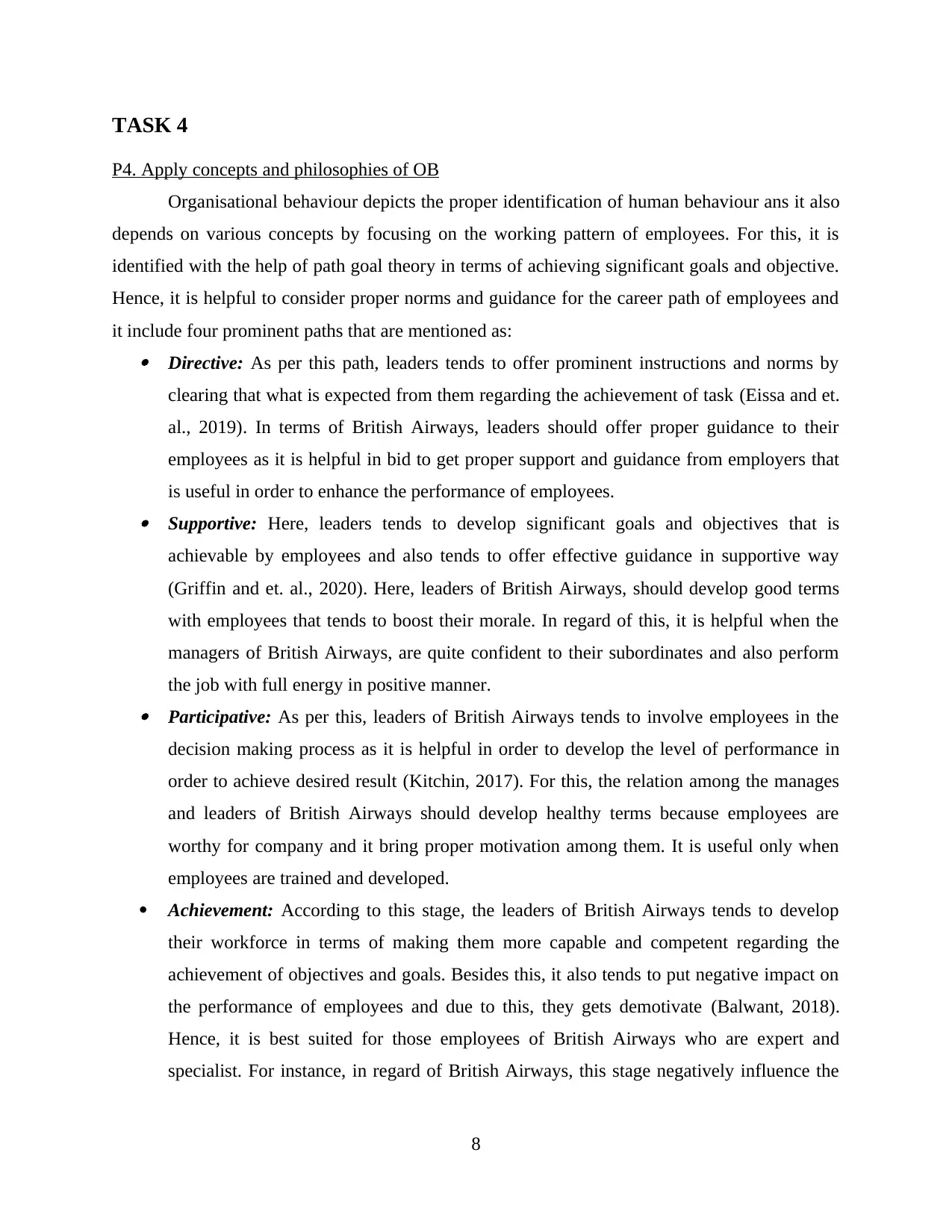
TASK 4
P4. Apply concepts and philosophies of OB
Organisational behaviour depicts the proper identification of human behaviour ans it also
depends on various concepts by focusing on the working pattern of employees. For this, it is
identified with the help of path goal theory in terms of achieving significant goals and objective.
Hence, it is helpful to consider proper norms and guidance for the career path of employees and
it include four prominent paths that are mentioned as: Directive: As per this path, leaders tends to offer prominent instructions and norms by
clearing that what is expected from them regarding the achievement of task (Eissa and et.
al., 2019). In terms of British Airways, leaders should offer proper guidance to their
employees as it is helpful in bid to get proper support and guidance from employers that
is useful in order to enhance the performance of employees. Supportive: Here, leaders tends to develop significant goals and objectives that is
achievable by employees and also tends to offer effective guidance in supportive way
(Griffin and et. al., 2020). Here, leaders of British Airways, should develop good terms
with employees that tends to boost their morale. In regard of this, it is helpful when the
managers of British Airways, are quite confident to their subordinates and also perform
the job with full energy in positive manner. Participative: As per this, leaders of British Airways tends to involve employees in the
decision making process as it is helpful in order to develop the level of performance in
order to achieve desired result (Kitchin, 2017). For this, the relation among the manages
and leaders of British Airways should develop healthy terms because employees are
worthy for company and it bring proper motivation among them. It is useful only when
employees are trained and developed.
Achievement: According to this stage, the leaders of British Airways tends to develop
their workforce in terms of making them more capable and competent regarding the
achievement of objectives and goals. Besides this, it also tends to put negative impact on
the performance of employees and due to this, they gets demotivate (Balwant, 2018).
Hence, it is best suited for those employees of British Airways who are expert and
specialist. For instance, in regard of British Airways, this stage negatively influence the
8
P4. Apply concepts and philosophies of OB
Organisational behaviour depicts the proper identification of human behaviour ans it also
depends on various concepts by focusing on the working pattern of employees. For this, it is
identified with the help of path goal theory in terms of achieving significant goals and objective.
Hence, it is helpful to consider proper norms and guidance for the career path of employees and
it include four prominent paths that are mentioned as: Directive: As per this path, leaders tends to offer prominent instructions and norms by
clearing that what is expected from them regarding the achievement of task (Eissa and et.
al., 2019). In terms of British Airways, leaders should offer proper guidance to their
employees as it is helpful in bid to get proper support and guidance from employers that
is useful in order to enhance the performance of employees. Supportive: Here, leaders tends to develop significant goals and objectives that is
achievable by employees and also tends to offer effective guidance in supportive way
(Griffin and et. al., 2020). Here, leaders of British Airways, should develop good terms
with employees that tends to boost their morale. In regard of this, it is helpful when the
managers of British Airways, are quite confident to their subordinates and also perform
the job with full energy in positive manner. Participative: As per this, leaders of British Airways tends to involve employees in the
decision making process as it is helpful in order to develop the level of performance in
order to achieve desired result (Kitchin, 2017). For this, the relation among the manages
and leaders of British Airways should develop healthy terms because employees are
worthy for company and it bring proper motivation among them. It is useful only when
employees are trained and developed.
Achievement: According to this stage, the leaders of British Airways tends to develop
their workforce in terms of making them more capable and competent regarding the
achievement of objectives and goals. Besides this, it also tends to put negative impact on
the performance of employees and due to this, they gets demotivate (Balwant, 2018).
Hence, it is best suited for those employees of British Airways who are expert and
specialist. For instance, in regard of British Airways, this stage negatively influence the
8
Paraphrase This Document
Need a fresh take? Get an instant paraphrase of this document with our AI Paraphraser
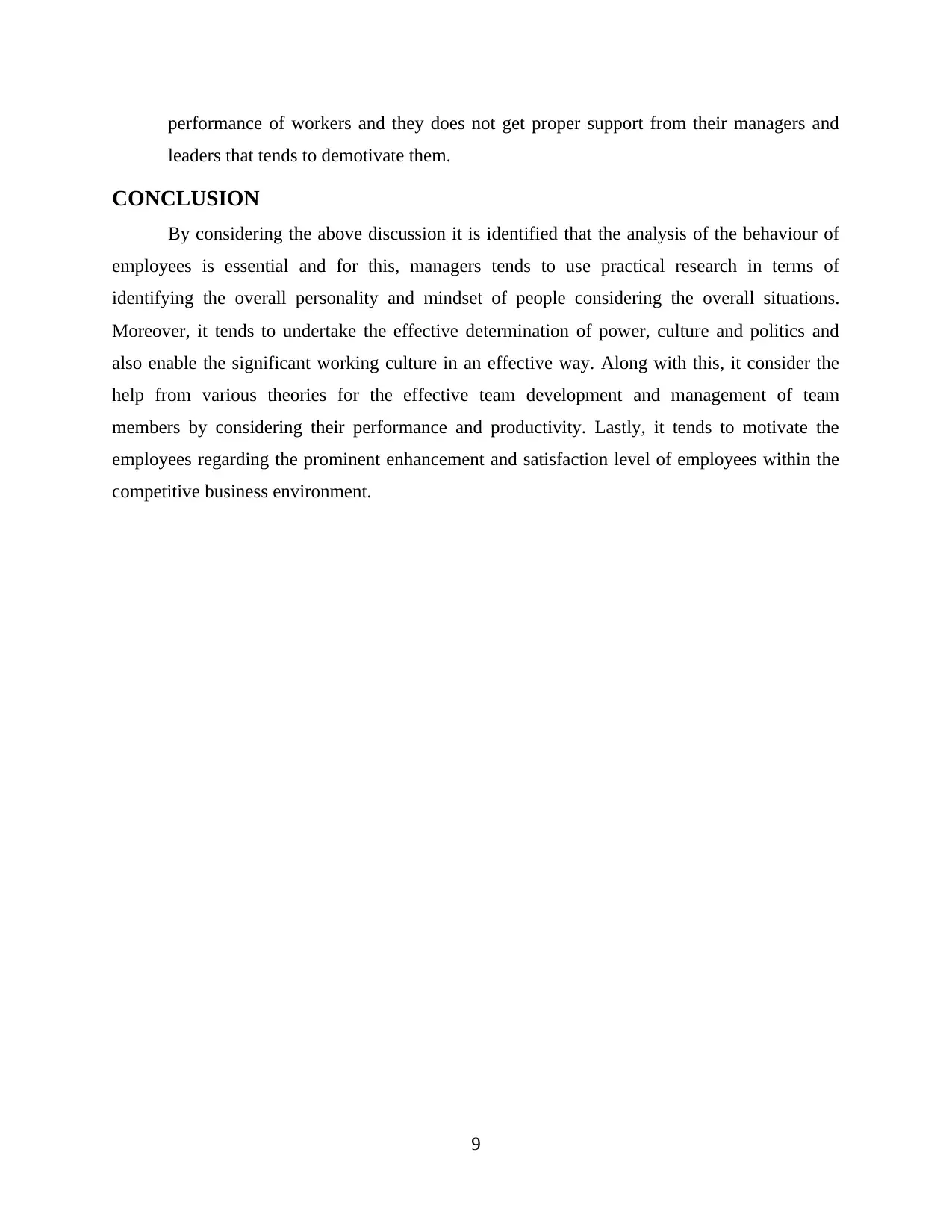
performance of workers and they does not get proper support from their managers and
leaders that tends to demotivate them.
CONCLUSION
By considering the above discussion it is identified that the analysis of the behaviour of
employees is essential and for this, managers tends to use practical research in terms of
identifying the overall personality and mindset of people considering the overall situations.
Moreover, it tends to undertake the effective determination of power, culture and politics and
also enable the significant working culture in an effective way. Along with this, it consider the
help from various theories for the effective team development and management of team
members by considering their performance and productivity. Lastly, it tends to motivate the
employees regarding the prominent enhancement and satisfaction level of employees within the
competitive business environment.
9
leaders that tends to demotivate them.
CONCLUSION
By considering the above discussion it is identified that the analysis of the behaviour of
employees is essential and for this, managers tends to use practical research in terms of
identifying the overall personality and mindset of people considering the overall situations.
Moreover, it tends to undertake the effective determination of power, culture and politics and
also enable the significant working culture in an effective way. Along with this, it consider the
help from various theories for the effective team development and management of team
members by considering their performance and productivity. Lastly, it tends to motivate the
employees regarding the prominent enhancement and satisfaction level of employees within the
competitive business environment.
9
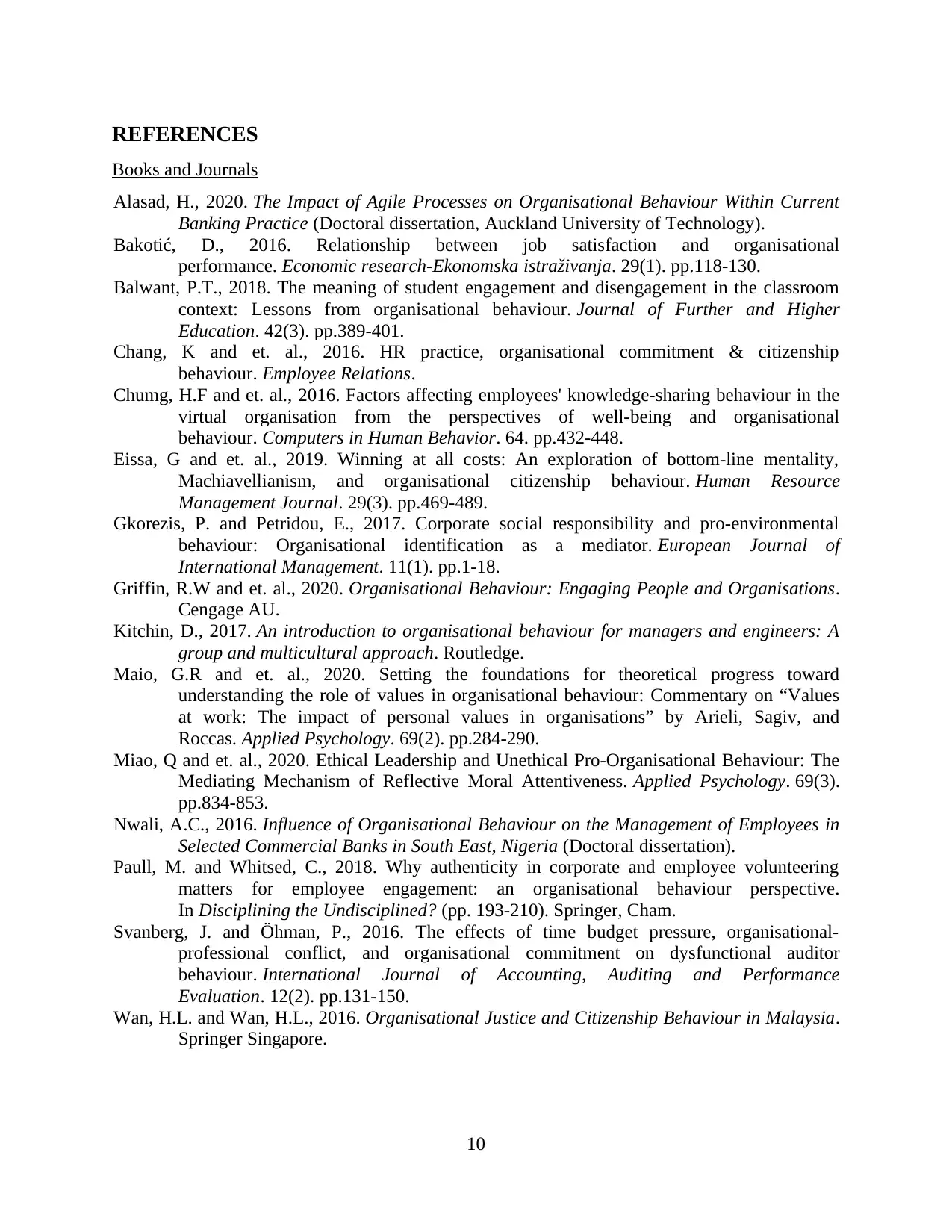
REFERENCES
Books and Journals
Alasad, H., 2020. The Impact of Agile Processes on Organisational Behaviour Within Current
Banking Practice (Doctoral dissertation, Auckland University of Technology).
Bakotić, D., 2016. Relationship between job satisfaction and organisational
performance. Economic research-Ekonomska istraživanja. 29(1). pp.118-130.
Balwant, P.T., 2018. The meaning of student engagement and disengagement in the classroom
context: Lessons from organisational behaviour. Journal of Further and Higher
Education. 42(3). pp.389-401.
Chang, K and et. al., 2016. HR practice, organisational commitment & citizenship
behaviour. Employee Relations.
Chumg, H.F and et. al., 2016. Factors affecting employees' knowledge-sharing behaviour in the
virtual organisation from the perspectives of well-being and organisational
behaviour. Computers in Human Behavior. 64. pp.432-448.
Eissa, G and et. al., 2019. Winning at all costs: An exploration of bottom‐line mentality,
Machiavellianism, and organisational citizenship behaviour. Human Resource
Management Journal. 29(3). pp.469-489.
Gkorezis, P. and Petridou, E., 2017. Corporate social responsibility and pro-environmental
behaviour: Organisational identification as a mediator. European Journal of
International Management. 11(1). pp.1-18.
Griffin, R.W and et. al., 2020. Organisational Behaviour: Engaging People and Organisations.
Cengage AU.
Kitchin, D., 2017. An introduction to organisational behaviour for managers and engineers: A
group and multicultural approach. Routledge.
Maio, G.R and et. al., 2020. Setting the foundations for theoretical progress toward
understanding the role of values in organisational behaviour: Commentary on “Values
at work: The impact of personal values in organisations” by Arieli, Sagiv, and
Roccas. Applied Psychology. 69(2). pp.284-290.
Miao, Q and et. al., 2020. Ethical Leadership and Unethical Pro‐Organisational Behaviour: The
Mediating Mechanism of Reflective Moral Attentiveness. Applied Psychology. 69(3).
pp.834-853.
Nwali, A.C., 2016. Influence of Organisational Behaviour on the Management of Employees in
Selected Commercial Banks in South East, Nigeria (Doctoral dissertation).
Paull, M. and Whitsed, C., 2018. Why authenticity in corporate and employee volunteering
matters for employee engagement: an organisational behaviour perspective.
In Disciplining the Undisciplined? (pp. 193-210). Springer, Cham.
Svanberg, J. and Öhman, P., 2016. The effects of time budget pressure, organisational-
professional conflict, and organisational commitment on dysfunctional auditor
behaviour. International Journal of Accounting, Auditing and Performance
Evaluation. 12(2). pp.131-150.
Wan, H.L. and Wan, H.L., 2016. Organisational Justice and Citizenship Behaviour in Malaysia.
Springer Singapore.
10
Books and Journals
Alasad, H., 2020. The Impact of Agile Processes on Organisational Behaviour Within Current
Banking Practice (Doctoral dissertation, Auckland University of Technology).
Bakotić, D., 2016. Relationship between job satisfaction and organisational
performance. Economic research-Ekonomska istraživanja. 29(1). pp.118-130.
Balwant, P.T., 2018. The meaning of student engagement and disengagement in the classroom
context: Lessons from organisational behaviour. Journal of Further and Higher
Education. 42(3). pp.389-401.
Chang, K and et. al., 2016. HR practice, organisational commitment & citizenship
behaviour. Employee Relations.
Chumg, H.F and et. al., 2016. Factors affecting employees' knowledge-sharing behaviour in the
virtual organisation from the perspectives of well-being and organisational
behaviour. Computers in Human Behavior. 64. pp.432-448.
Eissa, G and et. al., 2019. Winning at all costs: An exploration of bottom‐line mentality,
Machiavellianism, and organisational citizenship behaviour. Human Resource
Management Journal. 29(3). pp.469-489.
Gkorezis, P. and Petridou, E., 2017. Corporate social responsibility and pro-environmental
behaviour: Organisational identification as a mediator. European Journal of
International Management. 11(1). pp.1-18.
Griffin, R.W and et. al., 2020. Organisational Behaviour: Engaging People and Organisations.
Cengage AU.
Kitchin, D., 2017. An introduction to organisational behaviour for managers and engineers: A
group and multicultural approach. Routledge.
Maio, G.R and et. al., 2020. Setting the foundations for theoretical progress toward
understanding the role of values in organisational behaviour: Commentary on “Values
at work: The impact of personal values in organisations” by Arieli, Sagiv, and
Roccas. Applied Psychology. 69(2). pp.284-290.
Miao, Q and et. al., 2020. Ethical Leadership and Unethical Pro‐Organisational Behaviour: The
Mediating Mechanism of Reflective Moral Attentiveness. Applied Psychology. 69(3).
pp.834-853.
Nwali, A.C., 2016. Influence of Organisational Behaviour on the Management of Employees in
Selected Commercial Banks in South East, Nigeria (Doctoral dissertation).
Paull, M. and Whitsed, C., 2018. Why authenticity in corporate and employee volunteering
matters for employee engagement: an organisational behaviour perspective.
In Disciplining the Undisciplined? (pp. 193-210). Springer, Cham.
Svanberg, J. and Öhman, P., 2016. The effects of time budget pressure, organisational-
professional conflict, and organisational commitment on dysfunctional auditor
behaviour. International Journal of Accounting, Auditing and Performance
Evaluation. 12(2). pp.131-150.
Wan, H.L. and Wan, H.L., 2016. Organisational Justice and Citizenship Behaviour in Malaysia.
Springer Singapore.
10
⊘ This is a preview!⊘
Do you want full access?
Subscribe today to unlock all pages.

Trusted by 1+ million students worldwide
1 out of 12
Related Documents
Your All-in-One AI-Powered Toolkit for Academic Success.
+13062052269
info@desklib.com
Available 24*7 on WhatsApp / Email
![[object Object]](/_next/static/media/star-bottom.7253800d.svg)
Unlock your academic potential
Copyright © 2020–2026 A2Z Services. All Rights Reserved. Developed and managed by ZUCOL.




